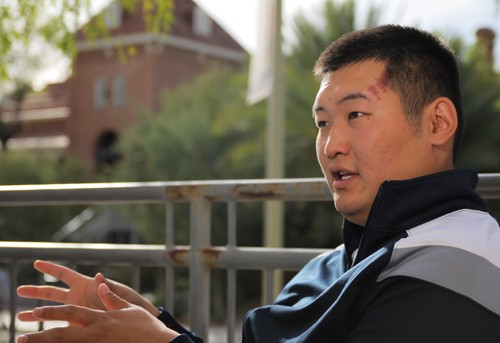Among UA’s diverse international population, Mongolia is a minority, with only three students currently on campus.
The Asian country, landlocked between Russia and China, sent the first Mongolian student to the department of mining and geological engineering’s graduate program this fall.
Khas Mariaviisenge, 27, saw an ad in the paper from Peabody Energy in 2009, the coal company that develops projects in Mongolia, for bachelors in mining. When he attended the meeting, he also met Mary Poulton, the head of the department.
Khas received a full scholarship to seek his master’s degree in mineral resources at the UA. Once he completes his degree, he’ll go back to Mongolia and, depending on his performance here, be hired by the company.
“”This is a once in a lifetime opportunity to a guy like me — get here and study,”” he said.
As part of Peabody’s effort in expanding business in Mongolia, the company wanted to have employees trained in the U.S., Poulton said. Khas was the first to be selected, but she predicted more would come, including some undergraduates.
Khas, who majored in mining engineering in Moscow, had a hard time adjusting to the grade system and the way classes are set up at the UA, with shorter class periods but a lot more homework.
He said the biggest difference coming to the U.S. was in class.
“”Every kid in the world — maybe — is raised on American movies and music, and American media, right? So nothing was really that shocking,”” he said. “”Just in class, the teachers and students, the communication between each other. And everything’s digital, like D2L.””
He’s among a handful of Mongolian students who came to the UA for a master’s degree to date. When he arrived, he connected with astronomy senior Sukhbold Tuguldur, one of two Mongolian undergrads at the UA.
Tuguldur helped him learn his way around.
“”At first, I had so many questions,”” Khas said.
Tuguldur also managed, by chance, to come to the U.S. to earn his degree.
Thanks to a meteor shower in Mongolia in 1999, faculty from UA’s Lunar and Planetary Laboratory made a visit to the country, and made contact with local astronomers. This is how Tuguldur learned about the UA’s program.
“”When I applied, that’s the only school I knew in the U.S.,”” he said.
With scholarships from the astronomy department and UA funding for international students, he plans to get his doctorate in the U.S., as his field isn’t one that the Mongolian government invests in, unlike Khas’ case.
From the countryside, where most families are nomadic and live in farms largely isolated from each other, Tuguldur now recounts awkward situations during his freshman year, as he tried to adjust to the culture here.
In his home country, “”there’s no toilet, the restroom is outside. In my freshman year I was peeing in the campus because it was after 5 p.m. and everything was closed. A police officer cited me,”” Tuguldur said.
Khas said the reason there aren’t more Mongolian students at the UA is because of a language barrier, where most people don’t speak a foreign language, and the country’s developing stage, becoming a democracy 20 years ago. Also, most parents can’t afford to send their children to study abroad.
“”People in other countries, some were born rich, because their parents were rich and they inherited it,”” he said. “”We don’t have nothing like that.
“”We were democratized from communism, where everybody’s property is state property. Everybody works, but it doesn’t matter how much you work, you get equal amount of salaries. So we don’t have wealth inherited to the next generation.””









